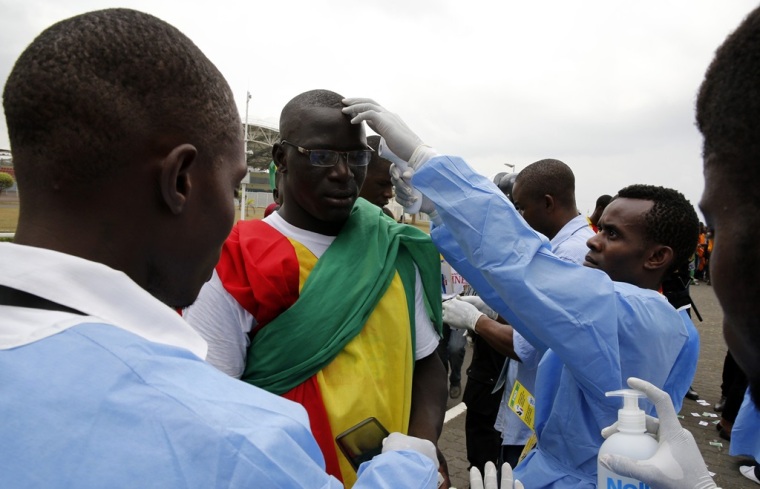Ebola Outbreak Latest News 2015: Mali Declared Ebola-Free But Not 'Devoid Of Risk'

Mali's minister of health has announced that the country is now free of Ebola, as 42 days have passed since its last patient tested negative for the deadly virus.
Mali's health minister said in a statement that the country's last known Ebola patient tested negative for the virus Dec. 6, but clarified that "Mali isn't completely devoid of risk as long as this epidemic hasn't been conquered at our borders to the south," the L.A. Times reported.
The outbreak has infected more than 21,000 people, killing 8,429, data up to Jan. 11 collected by the World Health Organization showed.
Mali has eight Ebola cases, of which six resulted in death.
The disease entered Mali through a 2-year-old girl from Guinea. who later died Oct. 24. None of her contacts in Mali developed Ebola symptoms.
Meanwhile, Professor Peter Piot, who co-discovered the Ebola virus in 1976 and is now chief of the London School of Hygiene & Tropical Medicine, warned that developed countries are "vulnerable" to epidemics like Ebola and will be in "deep trouble" if they fail to prepare for another outbreak.
Piot, who is set to address the World Economic Forum in Davos alongside heads of pharmaceutical firms and West African leaders, said the Western world should invest more in researching vaccines and asked global leaders to take a "long-term view," according to a report by BBC News on Tuesday.
"Our world is getting more vulnerable to big epidemics, because of population expansion, huge mobility and more intense contact between animals and people," he was quoted to have said.
"My concern is that when [the Ebola outbreak] is over we will just forget about it. We need to be better prepared and we need to invest in vaccines and treatment."
"It's like a fire brigade - you don't start to set up a fire brigade when some house is on fire."
He emphasized that Europe needs a force against infectious diseases that can be sent to countries outside its borders.
"There is always tension between the sovereignty of a country and the need to fight epidemics because they are a risk for the world as a whole... in economic terms, its a global public good."
Piot said that he never thought the Ebola virus "could affect entire nations, capital cities" because "after the first outbreak in 1976 we all thought this is a virus that is actually relatively easy to contain."
He also said that there was "neither a commercial incentive nor a public health rationale for dealing with Ebola" until the recent outbreak in West Africa.
 Christians don't have to affirm transgenderism, but they can’t express that view at work: tribunal
Christians don't have to affirm transgenderism, but they can’t express that view at work: tribunal Archaeology discovery: Medieval Christian prayer beads found on Holy Island
Archaeology discovery: Medieval Christian prayer beads found on Holy Island Presbyterian Church in America votes to leave National Association of Evangelicals
Presbyterian Church in America votes to leave National Association of Evangelicals Over 50 killed in 'vile and satanic' attack at Nigerian church on Pentecost Sunday
Over 50 killed in 'vile and satanic' attack at Nigerian church on Pentecost Sunday Ukrainian Orthodox Church severs ties with Moscow over Patriarch Kirill's support for Putin's war
Ukrainian Orthodox Church severs ties with Moscow over Patriarch Kirill's support for Putin's war Islamic State kills 20 Nigerian Christians as revenge for US airstrike
Islamic State kills 20 Nigerian Christians as revenge for US airstrike Man who served 33 years in prison for murder leads inmates to Christ
Man who served 33 years in prison for murder leads inmates to Christ


 Nigerian student beaten to death, body burned over ‘blasphemous’ WhatsApp message
Nigerian student beaten to death, body burned over ‘blasphemous’ WhatsApp message 'A new low': World reacts after Hong Kong arrests 90-year-old Cardinal Joseph Zen
'A new low': World reacts after Hong Kong arrests 90-year-old Cardinal Joseph Zen Iran sentences Christian man to 10 years in prison for hosting house church worship gathering
Iran sentences Christian man to 10 years in prison for hosting house church worship gathering French Guyana: Pastor shot dead, church set on fire after meeting delegation of Evangelicals
French Guyana: Pastor shot dead, church set on fire after meeting delegation of Evangelicals ‘Talking Jesus’ report finds only 6% of UK adults identify as practicing Christians
‘Talking Jesus’ report finds only 6% of UK adults identify as practicing Christians Mission Eurasia ministry center blown up in Ukraine, hundreds of Bibles destroyed: 'God will provide'
Mission Eurasia ministry center blown up in Ukraine, hundreds of Bibles destroyed: 'God will provide' Church holds service for first time after ISIS desecrated it 8 years ago
Church holds service for first time after ISIS desecrated it 8 years ago Burger King apologizes for 'offensive campaign' using Jesus' words at the Last Supper
Burger King apologizes for 'offensive campaign' using Jesus' words at the Last Supper Uganda: Muslims abduct teacher, burn him inside mosque for praying in Christ’s name
Uganda: Muslims abduct teacher, burn him inside mosque for praying in Christ’s name